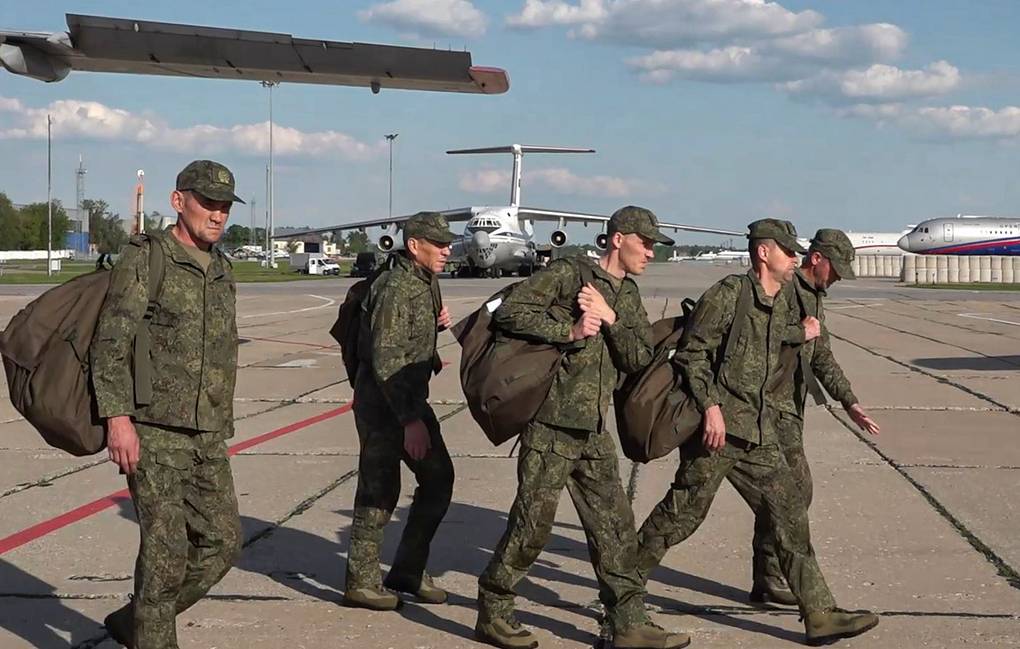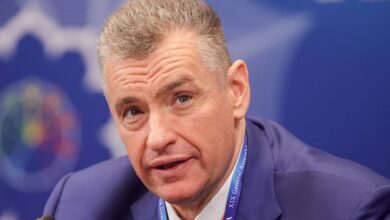Press review: Moscow, Kiev swap POWs as NATO shifts exercise tactics amid Ukraine conflict
Top stories from the Russian press on Monday, May 26th
MOSCOW, May 26. /TASS/. Russia and Ukraine carry out POW exchanges and launch strikes ahead of a second round of talks, and NATO begins the second stage of its Defender 25 — Immediate Response drills. Meanwhile, India initiates a global antiterror campaign targeting Pakistan. These stories topped Monday's newspaper headlines in Russia.
Izvestia: Moscow, Kiev exchange POWs, attacks ahead of 2nd round of talks that Switzerland proposed to host
Izvestia has learned that Switzerland is working to offer a venue for a new round of talks between Moscow and Kiev. The country maintains contacts both with Russia and Ukraine to be able to host any future negotiations, the Swiss Federal Department of Foreign Affairs told the newspaper. While the Vatican was mentioned among other potential venues earlier, Russian Foreign Minister Sergey Lavrov dismissed the option as barely feasible. Meanwhile, over the weekend, Russia and Ukraine completed a major prisoner exchange, and Russia delivered a heavy strike on facilities on Ukrainian soil in the early hours of Sunday in response to massive Ukrainian drone attacks.
Russia’s move to propose POW swap with Ukraine disproves idea it doesn’t want talks — MFA
There is not a single country left in Europe that, in Moscow’s view, wouldn’t have lost its uniqueness as a neutral venue for talks. So far, Turkey, which has hosted several rounds of peace negotiations since the conflict erupted, remains the most suitable country where dialogue between Russia and Ukraine could continue, Tigran Meloyan, an analyst with the Center for Mediterranean Studies at the Higher School of Economics, told Izvestia. "Apart from Turkey, Saudi Arabia, too, could host negotiations. The kingdom has already received top diplomats, including Russian Foreign Minister Sergey Lavrov and US Secretary of State Marco Rubio. And it could possibly act as a host when it comes to organizing high-profile meetings," the expert believes.
Meanwhile, the European Union and the United States are still poles apart about negotiations with Russia. The thing is the EU does not currently have too many options for independent actions: while the bloc has not resorted to any original or innovative instruments for a long time, it can threaten force without US support only rhetorically, Senior Research Fellow at the Institute of International Studies of MGIMO University Egor Sergeyev told the newspaper.
And Rubio’s argument toward the need of toughening the sanctions regime on Russia and Iran and a similar position voiced by the ousted US national security adviser, Michael Waltz, who has been nominated for the post of the United States’ UN envoy did not find support among Donald Trump. The US leader appreciates his team’s public loyalty even if they disagree with him internally, Higher School of Economics analyst Yegor Toropov emphasizes. "Since his election win in November when Trump pledged to stop the [Ukraine] conflict within 24 hours, he has distanced himself from specific details and is ready to announce the launch of direct talks between the delegations as his own major diplomatic victory," the expert said.
Izvestia: NATO changes tack in its exercises amid ongoing Ukraine conflict
On May 26, the second stage of NATO’s Defender 25 — Immediate Response drills will kick off in eight Southeast European nations. During the exercise, the alliance will practice joint combat operations against various threats, including in the cyber sphere. The participation of around 12,000 troops from 19 countries has been announced.
Namely, the exercise, set to run through June 9, will be held in Albania, Bulgaria, Croatia, Greece, Kosovo, Montenegro, North Macedonia, and Slovakia, where NATO troops will practice joint shooting, river crossings, integration with partner nations, and, separately, cybersecurity operations.
The bloc is clearly preparing for a war of the future, military expert Alexey Leonkov suggested. Now, NATO is adapting combat training scenarios given the experience in the Ukraine conflict zone. "It is no news that Ukraine has been a military testing ground for them," the expert told Izvestia. "The alliance finds it important to test how its troops will interact amid strong counteraction from our electronic warfare systems. The drills will be held both at training grounds in Southeastern Europe and at the level of headquarters of other NATO countries," he said.
The Defender Europe 2025 exercise will be much smaller in scale than the Steadfast Defender 2024 that involved 90,000 NATO troops last year, because the North Atlantic Alliance does not have too many troops that could be constantly moved across Europe and on the border with Russia, another military expert, Viktor Litovkin, explained to Izvestia. He does not expect anything extraordinary that would make Russia nervous from the coming maneuvers. "But, of course, we will certainly monitor them. It will be of particular interest to see how NATO troops will adjust their approach, given their experience in the special military operation zone," he concluded.
Vedomosti: India launches global antiterror campaign targeting Pakistan
A delegation representing all key Indian parties visited Moscow on May 24 before setting off for Europe. According to the Indian lawmakers who came to Moscow, Pakistan supports transborder terrorism targeting India, and they called the Indian strikes on Pakistan earlier this month the most restrained possible and just response to the Kashmir terror attack in April.
At a news conference at the Embassy of India in Moscow, Kanimozhi Karunanidhi, who led the Indian delegation, explained that New Delhi would like Moscow and other key countries to "understand what is happening on the ground" and support India in its fight against terrorism. "We are very happy to have Russia on our side," she stressed.
Karunanidhi and other Indian delegates have repeatedly emphasized that Moscow is a strategic ally of New Delhi. After the news conference, a member of the Indian delegation told Vedomosti that Greece, Spain, Slovenia, and Latvia will be the next destinations on their diplomatic tour. Besides, Indian Ambassador Vinay Kumar told a Vedomosti correspondent that the MPs will visit another four European countries without disclosing them. Nor did he explain the logic behind this route.
And the Indian delegation chose not to involve other BRICS countries in its anti-Pakistani campaign.
The Indian legislators visited to make India’s position in the recent operation by its armed forces against Pakistan clear and attract as many supporters as possible, said Maria Savishcheva, a researcher with the South Asia and Indian Ocean Group at the Institute of World Economy and International Relations (IMEMO) under the Russian Academy of Sciences. In Europe, the Indian delegation will likely try to present the actions of its armed forces as an act of self-defense consistent with international law, Savishcheva believes. "The Indian delegation will obviously seek to clarify its position in European capitals so that the Europeans can put pressure on Islamabad in the case of another conflict," she maintained.
"Obviously, the Indian lawmakers will try to persuade the world that it is not just the India-Pakistan conflict but rather a fight against terrorism in which everybody must rally around New Delhi," research fellow at the Center for Indo-Pacific Studies at the Institute of World Economy and International Relations Gleb Makarevich argued.
Kommersant: Russia takes part in military expos in Belarus, Malaysia
Last week, Russia participated in two military exhibitions at once — in MILEX that was held in Minsk and in the LIMA 2025 International Exhibition of Aerospace and Naval Equipment in Langkawi. Despite some aspects that the two defense shows had in common, such as the Su-57E prospective multirole fighter that was a highlight at both, Russia pursued two different goals: while its presence at MILEX was to confirm the solid bilateral relations as allies with Belarus, taking part again in LIMA was the first step toward regaining its positions in the region.
Russia remains among top five global arms exporters — Putin
Belarus is not among key suppliers of weapons or military hardware, and MILEX itself is rather a regional exhibition designed to showcase mostly internal projects. The fact that few foreign delegations visited Minsk proves that: a Russian defense company official told Kommersant that, in the Belarusian capital, representatives of the Iranian Defense Ministry presented three models of drones, and the Pakistani military, too, took part, while China Aerospace Science and Technology Corporation (CASC) held a presentation of its CH-9 unmanned aerial vehicle. Several more countries were represented at the level of military attaches.
On the other hand, despite the higher status of LIMA as an exhibition, Russia shared plans of expanding cooperation with its partners in Southeast Asia exclusively at it.
True, Russia returned to Malaysia after a more than six-year long pause, therefore its participation in LIMA, just like in LAAD-2025 hosted by Rio de Janeiro recently, was mostly meant as a reentry of Russian military hardware to the global market, in particular to its Asia Pacific segment where, local military analysts say, Russia has retained strong competitive positions. "LIMA 2025 can as well be a turning point in how the region views Russian defense exports — not as weapons supplies, but as a platform for cooperation, innovation, and shared security," Aeromag Asia commented.
Vedomosti: Trump declares full-out trade war on EU
Following US President Donald Trump’s threat to impose a 50% tariff on EU imports starting on June 1, European Commissioner for Trade Maros Sefcovic said on May 24 that Brussels will be ready to defend its interests. On May 23, Trump wrote on his TruthSocial media that he is hitting the bloc with a 50% tariff as trade talks "are going nowhere."
Later Trump told reporters that he does not need a trade deal with the EU as he called on the Europeans to build factories in the United States to avoid the levy. US Treasury Secretary Scott Bessent gave a better explanation in an interview with Fox News later: "I would hope that this would light a fire under the EU."
Trump agrees to postpone introduction of 50% tariffs on EU goods
Meanwhile, key EU members are still clinging to the hope of negotiating things with the United States. German Finance Minister Lars Klingbeil, for one, also held talks with Bessent and told Bild that "now we need serious negotiations rather than new provocations." "American tariffs threaten the US economy no less than the German or the European economies. This trade conflict harms everybody and must be ended as soon as possible," he said.
Brussels will put up an active fight to protect against the tariffs announced by Trump, Deputy Director of the Institute of Europe at the Russian Academy of Sciences Vladislav Belov told Vedomosti. Harsh statements from ministers will be accompanied with countermeasures against whole industries and groups of goods, the expert believes, with car making, machine building and pharmaceuticals among the first sectors to be affected.
Trump continues the course toward a better trade balance, according to Ivan Timofeyev, program director of the Russian International Affairs Council (RIAC). The US leader is seeking further pressure with the EU as he believes that its member countries — individually or jointly — will negotiate with him for compromise, Timofeyev argues. As a result, even if "a 50% tariff is initially fixed on paper," the two sides may negotiate other options, he maintains. At the same time, the EU may try to impose retaliatory tariffs, but that would harm the bloc itself, the expert concluded.

